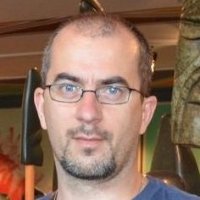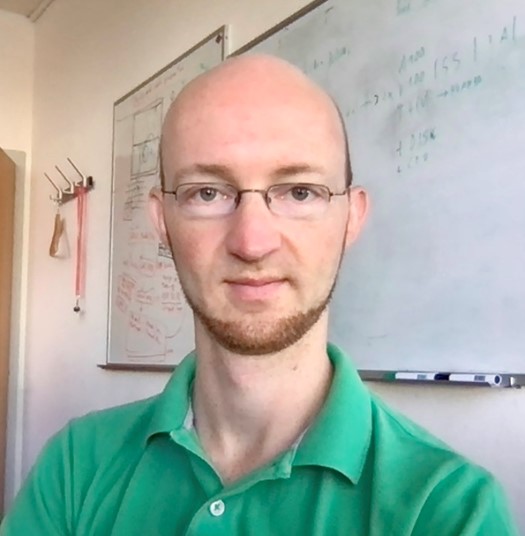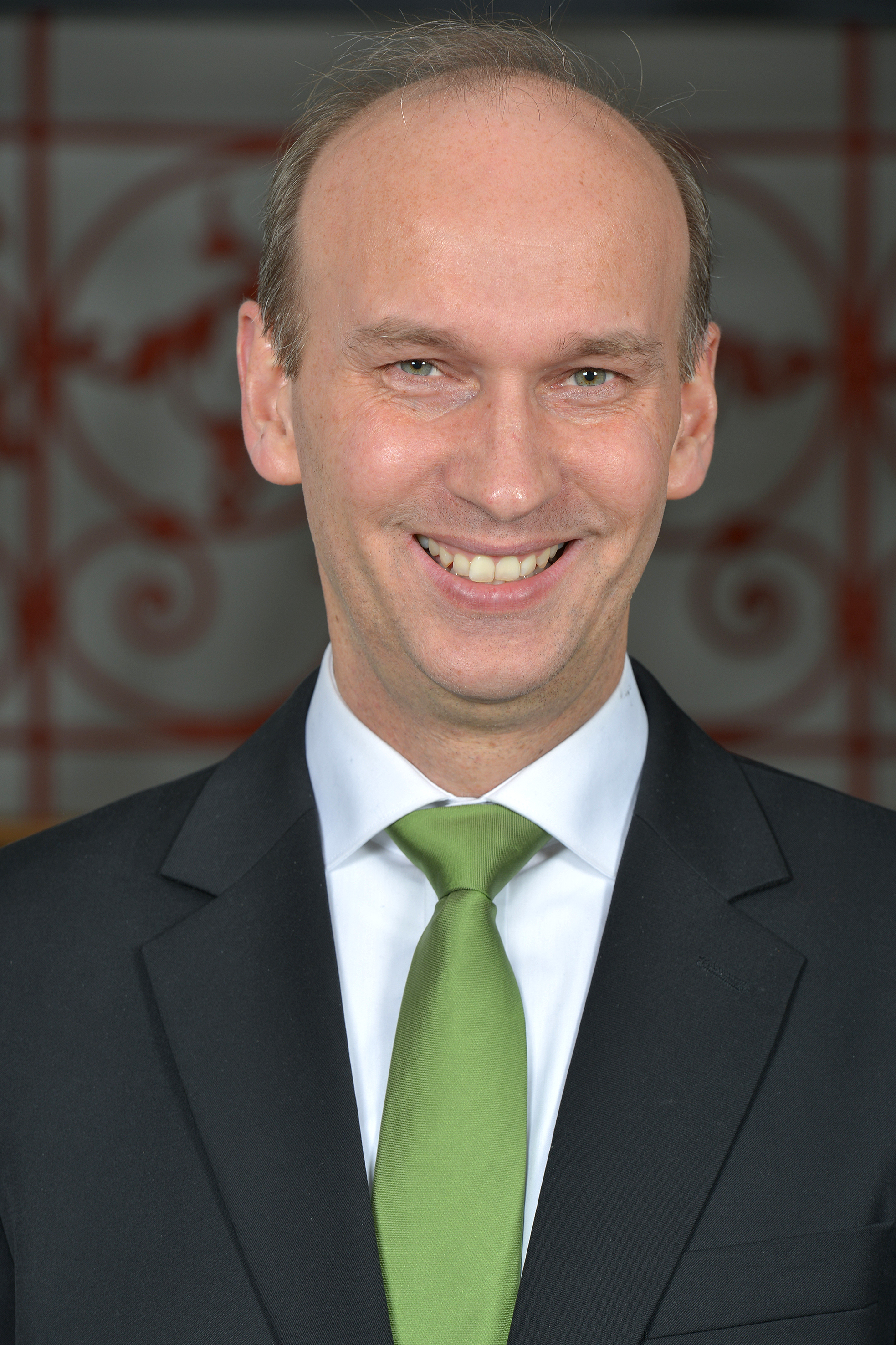 Andrei Gheata | CERN
Andrei Gheata | CERN
Andrei Gheata is an applied HEP physicist. He graduated in 1994 the University of Bucharest and holds a PhD in particle physics from the same university. Early 2000s he started working in the ALICE offline team at CERN, becoming an expert in several areas related to simulation, notably geometry modelling.
Andrei is the main author of several software components used in production by the ALICE experiment, in particular the data analysis framework.
Since 2015, Andrei is working on simulation code modernization and performance optimization in the CERN Software group, being actively involved in prototyping and developing parallel and vectorized solutions within the ongoing simulation R&D projects.
 Stephan Hageboeck | CERN
Stephan Hageboeck | CERN
Stephan is an applied physicist working in CERN's IT department. His focus is on GPU computing for high-energy physics, specifically on detector simulation and event generation (Geant4 and Madgraph).
He obtained a Ph.D. in particle physics at the University of Bonn in Germany, searching for decays of the Higgs boson within the ATLAS collaboration. Afterwards, he worked for the ROOT project at CERN, focussing on high-throughput computing, software performance analysis and RooFit, a package for fitting and statistical analysis of data.
 Pere Mato | CERN
Pere Mato | CERN
Pere Mato is a senior applied physicist at CERN. In 1990, he completed his graduate studies and obtained a Ph.D. in Physics from the University of Barcelona. He has been leading the SFT group in the Experimental Physics Department, which develops scientific software and provide support for the HEP experiments at CERN and worldwide. Notably, the group has contributed significantly to the creation of vital software packages such as Geant4 and ROOT. He has previously been a member of ALEPH (LEP) and LHCb (LHC) collaborations. In ALEPH he was working in the area of in the area of DAQ and slow controls, and later leading the TPC detector group. In LHCb, he was the software architect, responsible of the core software and data processing framework (GAUDI).
 Sebastian Lopienski | CERN
Sebastian Lopienski | CERN
During his work at CERN since 2001, Sebastian has had various assignments, including designing and developing software to manage and support services hosted in the CERN Computer Centre; providing Central CVS Service for software projects at CERN; and development of applications for accelerator controls in Java. He graduated from the University of Warsaw (MSc in Computer Science) in 2002, and earned an MBA degree at the Enterprise Administration Institute in Aix-en-Provence in 2010.
His professional interests include software and network security, distributed systems, and Web and mobile technologies. In his free time, he enjoys sailing, kitesurfing, skiing and traveling.
 Eamonn Maguire | Proton, Switzerland
Eamonn Maguire | Proton, Switzerland
Eamonn completed his DPhil (PhD) at the University of Oxford in computer science, focused on data visualization, in particular the systematisation of glyph design. His research interests are in the merging of machine learning and visual analytics.
Until November 2016 he was a Senior Marie Curie COFUND Fellow at CERN where he led development of the new hepdata.net platform and contributed to numerous other visualization and data projects at CERN.
Before that, he was the lead software engineer at the Oxford University e-Research Centre, where he led development of bioinformatics tools and a visual analytics platform for corporate insider threat detection.
 Alberto Pace | CERN
Alberto Pace | CERN
Alberto Pace is a member of the IT department at CERN where he leads the Compute and Devices group.
For several years, he has led the Storage group ensuring a coherent development process for Physics Data management activities, strongly driven by operational and user needs. He also represents CERN in the Advisory Board of the Internet Society (isoc.org) and the World Wide Web Consortium (w3c.org).
He has more than 30 years experiences in computing services, infrastructure, software engineering, accelerator control and accelerator operation. He graduated in Electronic Engineering from Politecnico di Milano (Italy) in 1987, where he received the first prize among Electronic Engineering students of the North Italy section.
 Andreas J. Peters | CERN
Andreas J. Peters | CERN
Andreas Peters is member of the CERN data management group. Since 1997 he worked as a student for the NA48 Collaboration at CERN in the development of the data acquisition system and a zero suppression system for the electro-magnetic calorimeter. He finished his PHD in physics at the University of Mainz in 2002 studying direct CP-violation in the neutral kaon system. 2002 he joined as a research fellow the ALICE experiment doing mainly development of GRID software and data management tools.
From 2004 on he stayed at CERN working for the European grid project EGEE focused on development of end-user tools for distributed analysis and distributed data management. In 2008 he joined the CERN data management group doing research and development for future data management at CERN.
Since 2010 he is project leader and core developer of the EOS storage system providing 135 PB of disk storage to all CERN experiments and a large user community.
 Arnulf Quadt | Universität Göttingen - Germany
Arnulf Quadt | Universität Göttingen - Germany
Arnulf Quadt is Full Professor of Physics at the University of Göttingen. He obtained his PhD from the University of Oxford, working on the ZEUS experiment at HERA. Subsequently, as postdoc he worked on projects on ZEUS at HERA, OPAL at LEP, D0 at the Tevatron and ATLAS at the LHC with the following institutes: University of Oxford, CERN, University of Bonn, Rochester University, Max-Planck-Institute of Physics and the University of Göttingen.
He founded the particle physics institute at the University of Göttingen in 2006. His main research interests are top quark physics, searches for Higgs bosons, searches for supersymmetry, grid computing and the ATLAS pixel detector.
He is the ERASMUS coordinator of the physics department, and hence deeply involved in teaching students from different countries as well as the transfer of credit points and grades.
Arnulf is the director of the II.Institute of Physics in Goettingen and teaching physics and computer science in Goettingen at undergraduate and graduate level.
 Toni Šćulac | Faculty of Science, University of Split - Croatia
Toni Šćulac | Faculty of Science, University of Split - Croatia
Toni was born and lives in Split, Croatia where he works as an associate professor at the Faculty of Science, University of Split.
He started working for the CMS experiment at CERN in 2015 as a part of his PhD studies. In 2018, he successfully defended his PhD thesis at Ecole Polytechnique (Paris, France) and University of Zagreb (Croatia).
His main expertise are studies of electron identification and Higgs boson physics. In 2020, he became a convener of the group that studies Higgs boson decays to two Z bosons.
During his studies, Toni attended CSC in Madrid in 2017 and tCSC in Split in 2018. Since he became associate professor in 2019 he already mentored several Bachelors and Master’s thesis and already co-supervised a PhD thesis. While continuing to develop as a scientist his main passion is mentoring students.
 Lukas Heinrich | Technische Universitat Munchen - Germany
Lukas Heinrich | Technische Universitat Munchen - Germany
---
Guest lecturer
 François Flückiger | CERN
François Flückiger | CERN
An Internet Veteran, François Flückiger was inducted into the Internet Hall of Fame in 2013 ("Influential engineers, activists, and entrepreneurs changed history through their vision and determination").
Director of the CERN School of Computing from 2003 to 2013, he was in charge of CERN external networking for two decades and held positions in infrastructure and application networking.
He was at the inception of Internet initiatives including CCIRN, RIPE, Ebone and ISOC. He took over Tim Berners-Lee to manage CERN's World-Wide Web team when the Web inventor left CERN for the MIT. As leader of the CERN Web team, he organized in 1994 the first ever open-source release of the CERN web software.
He is a lecturer at the University of Geneva, a member of the Internet Society Advisory Council (ISOC) and the W3C Advisory Committee, and the author of the reference textbook "Understanding Networked Multimedia" as well as more than 80 articles. He has 40 years of experience in networking and information technologies.
François Flückiger graduated from the Ecole Supérieure d'Electricité in 1973 and holds an MBA from the Enterprise Administration Institute in Paris in 1977.